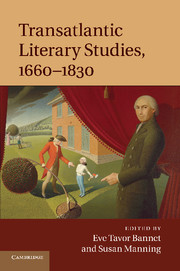Book contents
- Frontmatter
- Contents
- Notes on contributors
- Acknowledgements
- Introduction: British and American genres
- Chapter 1 Transatlantic books and literary culture
- Chapter 2 Transatlantic utopianism and the writing of America
- Chapter 3 Tales of wonder, spiritual autobiographies, and providence tales
- Chapter 4 Life writings
- Chapter 5 Benjamin Franklin and transatlantic literary journalism
- Chapter 6 Theatre, drama, performance
- Chapter 7 Transatlantic American Indians
- Chapter 8 Literature of the ocean
- Chapter 9 “To gird this watery globe”
- Chapter 10 Ghostly and vernacular presences in the black Atlantic
- Chapter 11 Susanna Rowson and the transatlantic captivity narrative
- Chapter 12 Domestic fiction and the reprint trade
- Chapter 13 Transatlantic Gothic
- Chapter 14 Transatlantic Romanticisms
- Chapter 15 Journeys of the imagination in Wheatley and Coleridge
- Chapter 16 Transatlantic historical fiction
- Further reading
- Index
- References
Chapter 12 - Domestic fiction and the reprint trade
Published online by Cambridge University Press: 05 January 2012
- Frontmatter
- Contents
- Notes on contributors
- Acknowledgements
- Introduction: British and American genres
- Chapter 1 Transatlantic books and literary culture
- Chapter 2 Transatlantic utopianism and the writing of America
- Chapter 3 Tales of wonder, spiritual autobiographies, and providence tales
- Chapter 4 Life writings
- Chapter 5 Benjamin Franklin and transatlantic literary journalism
- Chapter 6 Theatre, drama, performance
- Chapter 7 Transatlantic American Indians
- Chapter 8 Literature of the ocean
- Chapter 9 “To gird this watery globe”
- Chapter 10 Ghostly and vernacular presences in the black Atlantic
- Chapter 11 Susanna Rowson and the transatlantic captivity narrative
- Chapter 12 Domestic fiction and the reprint trade
- Chapter 13 Transatlantic Gothic
- Chapter 14 Transatlantic Romanticisms
- Chapter 15 Journeys of the imagination in Wheatley and Coleridge
- Chapter 16 Transatlantic historical fiction
- Further reading
- Index
- References
Summary
Practically and conceptually, on both sides of the Atlantic, the fundamental building block of society was not the individual, but the family. In the transatlantic formulation of John Locke (who was engaged with America through his position with the Lords of Trade and Plantations and through his master the Earl of Shaftesbury, and whose political philosophy underpinned both British and American thinking about government and society), a family consisted of “the Master of a Family with all these subordinate Relations of Wife, Children, Servants and Slaves united under the Domestick Rule of a Family.” As the principal locus of rural and urban production as well as of reproduction on both sides of the Atlantic, the “household-family” performed key economic, political, and socializing functions, many of which would later be taken over by the state: it educated children and trained apprentices; it fed, clothed, housed, and supervised children, servants, apprentices, and, in the New World, slaves; it also acted as society's chief manufacturer, employer, support network, patronage peddler, and welfare system. Family relations therefore often continued to link family members dispersed across the Atlantic world by commerce, schooling, apprenticeships, domestic service or indentures, migrations, marriage, and naval, military, or government work. In both Britain and America, masters of families in the propertied ranks also undertook significant local public administrative, political, military, and policing duties, further extending their power over others. For all these reasons, both in Britain and in the early Republic, the virtue, well-being, and good regulation of society as a whole were identified with the virtue, well-being, and good regulation of the family. A great deal of fiction was therefore devoted to the conduct of the family, much of it concerned with families in the employing and governing ranks.
Of the resulting domestic fiction, British and American scholars have focused most intensively on the seduction narrative or courtship novel. This centered on “young women standing virtually on the doorstep of definitive marital choices,” either to “dramatize the grounds on which the final crucial step was taken” or to demonstrate how those who made the wrong choices fell out of family and “Society,” into poverty, pregnancy, or prostitution, and miserable, lonely deaths. In America, this story has been credited with nation-building functions. However, while courtship and seduction novels had a great deal to say about relationships between parents and children, as well as about difficulties faced by daughters and orphans, they generally ended with a marriage or death, and thus with success or failure in establishing a new family. Other, now neglected, forms of domestic fiction on both sides of the Atlantic addressed sexual, social, and economic threats to the long-term stability and viability of the household-family. These might equally be credited with nation-building functions. These other – instructive, admonitory, regulatory, or reformist – forms of domestic fiction become visible when we consider the British novels that American printers were reprinting between c. 1785 and 1805.
- Type
- Chapter
- Information
- Transatlantic Literary Studies, 1660–1830 , pp. 186 - 201Publisher: Cambridge University PressPrint publication year: 2011



